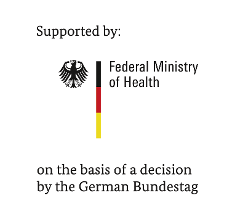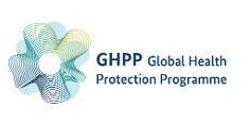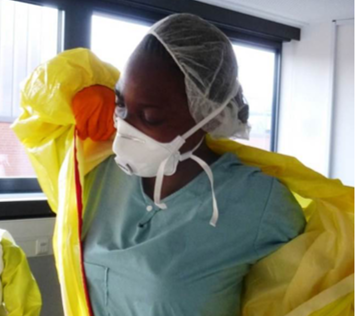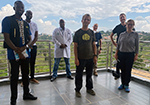Previous activities on Ebola virus disease (EVD)
- Training materials in Burkina Faso
- Trainers and training in Burkina Faso
- Evaluation and supervision
- The first EFFO training course in late 2014

![]() Participants of the HCID theme week and the EFFO team (© RKI)
Participants of the HCID theme week and the EFFO team (© RKI)
Operndorf Afrika has been a permanent cooperation partner of the EFFO project since 2019 and until the cessation of EFFO project activities in Burkina Faso at the end of 2021. The Robert Koch Institute and Operndorf Afrika organized a joint-workshop on "High-Consequence Infectious Diseases" (HCIDs) in Berlin. The aim was to connect the different actors of the project country, Burkina Faso, as well as to build capacities on a local level.
A previous workshop with the African partners was held in Burkina Faso, and involved experts from the Robert Koch Institute, the Medimisio Institute for Global Health and doctors from Burkina Faso and Senegal. Learning targets were identified and prioritized as part of a two-day workshop. Details, methods and contents were adjusted through continuous evaluations and based on new findings.
Training materials in Burkina Faso
Personal Protective Equipment (PPE) was the most elaborate training material used in the program. The EFFO project adopted similar PPE to that used by doctors without borders (MSF). In 2014, the global market was not prepared for the ensuing increase in demand and there were shortages. Directly affected countries were given priority in terms of protective equipment supplies. The second major shortage was related to protective hoods. In order to make the training as realistic as possible, a tailor in Ouagadougou sewed hoods out of cloth. Hoods made with the appropriate material were provided to the healthcare facilities at a later date.
In the meantime, the EFFO team in Germany developed systematic criteria that are key for the selection of Personal Protective Equipment (PPE).
Trainers and training in Burkina Faso
Trainers in Burkina Faso all had a medical background. This was helpful for medical modules in particular but was not a “must” for the training. Some of the trainers had received government-run EVD training and held leadership positions. The pilot phase involved four trainers, and these increased to ten until the cessation of project activities at the end of 2021. The trainers were re-trained for the PPE module as part of a three-day program. This concept was also first piloted in Burkina Faso. Our local partners worked with the Medimisio Institute for Global Health to decide where the training should be held. The venues were basic healthcare facilities or district and regional hospitals. About 100 health care workers in Burkina Faso underwent training.
Evaluation and supervision
The training at the healthcare facilities was followed by systematic supervision, which included an evaluation of whether basic hygiene measures were observed. A simulation exercise in Burkina Faso showed, amongst other things, that medical personnel combined several concepts of PPE. This can be highly problematic and should be discussed explicitly during training courses.
The first EFFO training course in late 2014
Following conceptual preparations by the international team, a three-day training program was first run at the “Centre Médical St Camille” in Koupéla from Dec 01 to Dec 03, 2014.
The program’s strengths and weaknesses quickly became apparent: High participant numbers were problematic, particularly in terms of practical exercises. The group had to be split into two. Normally this would not work, as it would require twice the number of trainers. If improvisation is necessary, e.g. in the case of a power outage, it is good to be able to flexibly reorganize learning modules. Repetition exercises and interactive learning modules specifically provide this sort of flexibility.
Whilst understanding of general hygiene measures and methods of disease transmission can be gained by reading and independently revising, this is not the case for PPE. The EFFO project places great emphasis on ensuring that the PPE module is only taught by trainers who have received specific training in this area. This concept was developed at the Robert Koch Institute and is constantly being improved. The aim for the train-the-trainer courses is to always involve people who have had actual experience with Ebola Virus Disease (EVD) patients.
Following the kick-off in Koupéla, the trainers evaluated the first training session, and discussed how to approach the next sessions. One group held a course in the capital, Ouagadougou (CMA - Centre médical avec antenne chirurgicale Paul VI), and another in Bobo-Dioulasso (Centre Médical Farakan). The experiences gained were used to devise an initial “best practice” structure for the EFFO training. Since then, numerous training courses have been conducted by the local Burkina Faso team in governmental and non-governmental healthcare facilities. Each training course was assessed by a theoretical pre- and post-test evaluation. The tests indicated an increased understanding of all issues. Especially in the initial phase, test results influenced the design of the training modules.
Date: 11.11.2019








